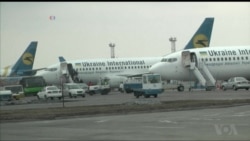A wave of cyberattacks that hit Ukraine and Russia spread beyond the borders of those countries, wreaking havoc on government and corporate computer systems in Europe and across the Atlantic.
Banks, government offices and airports in Ukraine were among the first to report the cyberattack. Ukrainian Deputy Prime Minister Pavlo Rozenko tweeted a photo of his black computer screen, saying the government's headquarters had been shut down.
Multiple international firms reported being affected Tuesday. They included America's Merck pharmaceutical company, Russia's Rosneft oil giant, the Danish shipping giant A.P. Moller-Maersk, British advertising giant WPP and French industrial group Saint-Gobain.
"We confirm our company's computer network was compromised today as part of global hack. Other organizations have also been affected," Merck said on Twitter.
Anders Rosendahl, a spokesman for A.P. Moller-Maersk, said the attack had "affected all branches" of the shipping group, both at home and abroad.
Information technology experts identified the virus as a type of ransomware — a program that is often used to hold data "hostage" until a payment is delivered.
A National Security Council spokesman said the Department of Homeland Security, the FBI and other agencies were "working with public and private, domestic and international partners to respond to this event and provide technical information for prevention and remediation."
"Individuals and organizations are discouraged from paying the ransom as this does not guarantee access will be restored," the spokesman added.
British Defense Minister Michael Fallon spoke earlier at a conference hosted by the Chatham House policy institute in London. He did not address the attack but discussed how Britain was responding in general to cybersecurity concerns.
"We are investing a huge chunk of money — some £1.9 billion [$2.4 billion] — into boosting our cybersecurity," Fallon said.
Europol's European Cybercrime Center told anyone affected by Tuesday's attack to report the crime to national police and encouraged those affected not to pay any ransom requested by hackers.
VOA's Jeff Seldin contributed to this report.









